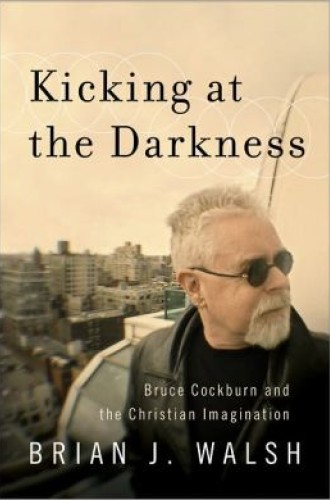Kicking at the Darkness, by Brian J. Walsh
Some of us owe a large part of whatever prophetic imagination we have to the creative powers of Bruce Cockburn. For pop-music-loving Bible readers of my generation, chances are he came to us via U2 of the late 1980s. In “God Part II,” from Rattle and Hum (1988), Bono tells of a late-night radio singer announcing his resolve to “kick the darkness / Till it bleeds daylight.” Liner-note readers like myself found next to this devastatingly evocative phrase a footnote introducing Cockburn, from whose “Lovers in a Dangerous Time” the line was purloined. From there I’m guessing sales of the Canadian bard’s albums—he’d been putting them out since 1970—spiked more than a little.
By that point, Brian Walsh, Christian Reformed chaplain to the University of Toronto, was already a devotee of Cockburn’s work. In his own theological engagement with our times, Walsh has never missed an opportunity to weave in Cockburn’s imagery. In this sense, Kicking at the Darkness exemplifies the “deep listening” and “deep receptivity” that Walsh attributes to Cockburn. It offers a powerfully articulate and thorough account of Cockburn’s theological vision. In the process, Walsh makes movingly explicit his debts to the singer’s albums and performances with regard to his own living, thinking and writing.
Looking hard at the world with Cockburn, Walsh believes that we begin to see the glory of God told in the heavens above and beneath our feet when we respond to “the gratuitous givenness” (Norman Wirzba’s phrase) of the natural universe. The sacramental insight of seeing nature as gift, as Walsh persuasively argues (with Sylvia Keesmaat) in Colossians Remixed, is central to the good news that the apostle Paul provocatively insisted has been somehow mysteriously and consistently proclaimed to every creature in the cosmos (Col. 1:21–23). Or as Walsh puts it, “Wherever there is life there is witness to this God.”



